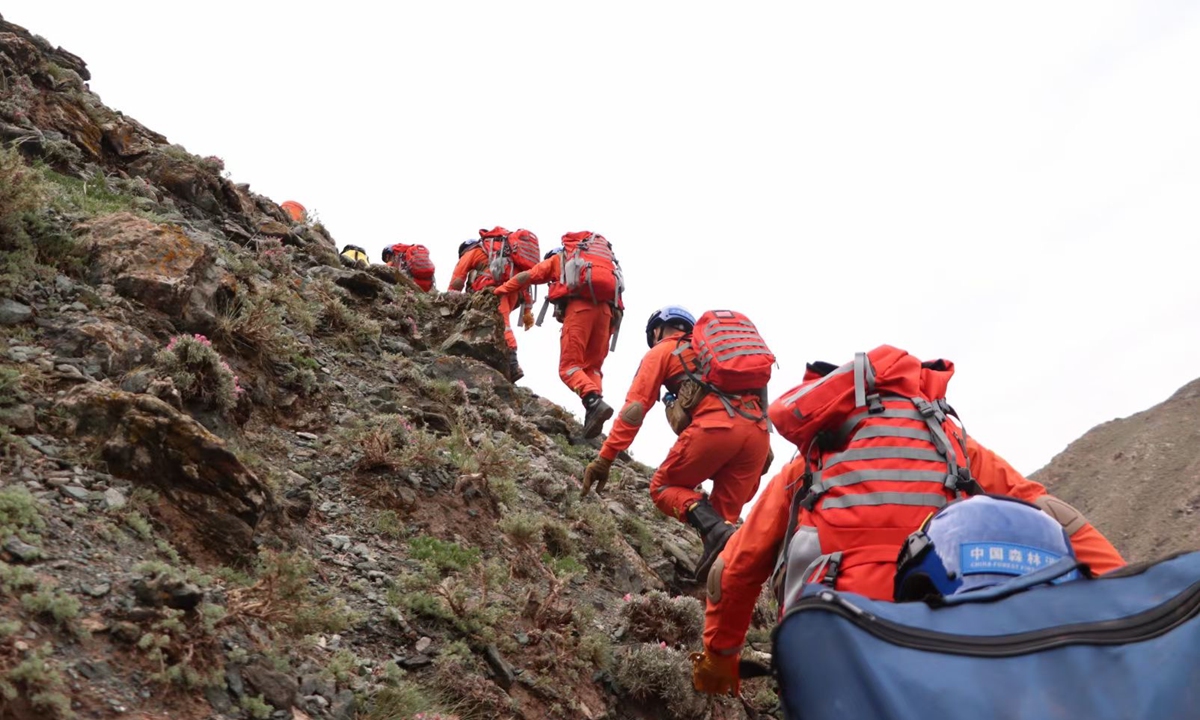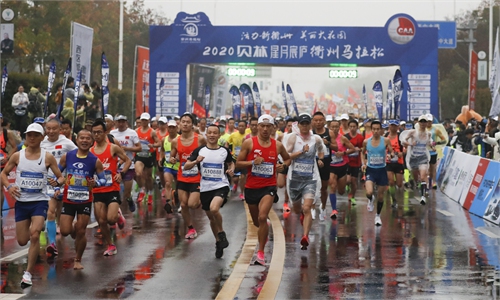Organizers, venue operators may be held accountable for Gansu's marathon tragedy: legal experts
Calls rise for full investigation of deaths of runners in Gansu

Rescue team search for victims of the deadly marathon in Baiyin, Gansu. Photo: Xinhua
Following one of the deadliest tragedies in China's marathon competition history, which took 21 lives on Saturday in Northwest China's Gansu Province, authorities and the public have urged a thorough investigation and serious pursuit of responsibility to pay tribute to the deceased and to ensure that similar incidents do not occur in the future.
On Sunday night, China's top disciplinary watchdog, the Central Commission for Discipline Inspection of the Communist Party of China, in a published commentary, pointed out that the specific causes of the incident and related responsibilities must be thoroughly investigated to give the victims and the public an explanation. "The loss of 21 lives is enough to sound the alarm to the entire society."
Legal experts said that the event's organizers, game hosts and venue operators may be subject to civil or even criminal penalties, depending on whether the investigation panel determines that the sudden extreme weather was an unpredictable case of force majeure.
The post-incident compensation work is under way in an orderly manner. The families of 20 of the 21 victims arrived in Baiyin in Gansu, where the game was held, on Monday to discuss the aftermath of the incident.
Sudden weather extremes are believed to be the primary cause of the accident. However, in the face of such a tragic event, the authorities and the public are reflecting on what could have been done to prevent the deaths, and which parties should be held responsible for such a tragedy.
Many veteran marathoners told the Global Times that the emergence of sudden weather extremes itself does not necessarily lead to the conclusion that the race was flawed, but the preparation and emergency rescue work was a test that the organizers in Gansu had failed.
"In addition to the weather changes, the organizers should also consider whether contestants from lower altitudes were ready for a race held at an altitude of more than 2,000 meters," Chen Penbin, one of China's top ultramarathon runners, told the Global Times on Monday.
According to public information, the organizers did not require the runners to train to cope with the plateau, nor did they even request the results of their physical checkups
Another experienced marathon runner, organizer and friend to many deceased contestants, surnamed Gong, also said that the organizers did not have a plan to deal with a large number of runners suffering hypothermia, which should be part of the race protection program.
Because Baiyin has entered the early summer season, the organizers did not require participants to bring warmer clothing, which Gong believed was a reflection of the organizers' lack of professionalism. "More could have survived if there was better equipment to keep them warm."
The shortage of supplies was seen in other faults by the organizers. According to the official announcement, the organizers ensured that water and food as well as rest stops were provided at every checkpoint. However, according to participants, at the third checkpoint, no supply points were set up due to the treacherous terrain, where most of the deceased runners perished, Shanghai-based news site Thepaper.cn reported.
Many senior runners pointed out that the track also had many design problems in the first place at the planning stage.
Public information shows that the Yellow River Shilin cross-country event had been held four times, all hosted by a small local sports company, Gansu Shengjing Sports Co. The company's registered staff has just over 20 people.
According to the Regulations on Safety Management of Mass Events, which the State Council rolled out in August 2007, the organizers of large mass events are responsible for the safety of the events they host, with the organizers bearing the primary responsibility.
If the contractor's safety program is unreasonable or does not obtain approval, it may constitute an administrative offense, and may even be suspected of having committed a crime of a major safety accident at a large mass event. The venue management, the organizers and the directly responsible supervisors may face civil liability or even criminal liability, legal experts told the Global Times.
Whether the parties are liable depends on the investigation report released afterward, Ruan Qilin, a professor at the China University of Political Science and Law, told the Global Times on Monday.
"If the accident investigation team ultimately determines that the casualties occurred due to unforeseen weather changes, rather than the responsibility of the organizer's emergency plan and prior notification, then it is unlikely that the organizers, contractors or venue management will bear criminal liability," Ruan noted.
At the same time, Ruan said that because the mountain cross-country marathon itself is a very risky event, runners participate at their own risk. "In similar accidents, athletes were often considered to be also partially responsible."
The Global Times noted that in the pre-race registration announcement, a disclaimer was included that states that if the athletes fail to finish the race for their own reasons, the organizers will not be held responsible, and that in the event of an unforeseen situation, the organizers have the final right to interpret the event.
Ruan remarked that such prior exclusion clauses are "meaningless" in the face of such a major accident.
The State General Administration of Sports held an emergency meeting on Sunday night on strengthening the security management of sports events, given the "serious security situation in the field."


